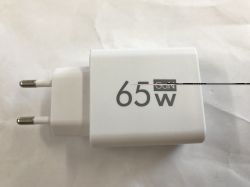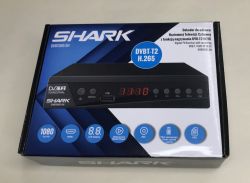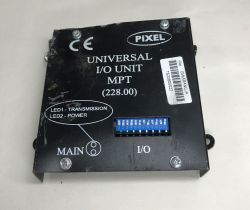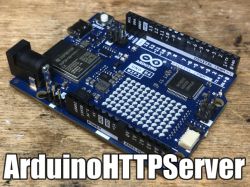
Here I will present the fixes, launch and development of the ArduinoHttpServer library on the Arduino R4 WiFi platform. The purpose of the topic will be to facilitate our operations related to the HTTP protocol, and more specifically, parsing HTTP requests (processing the header, resource path and GET arguments) and sending responses to these requests. By the way, I will also show a simple HTTP authorization system offered by this library.
The topic assumes that the user has a basic understanding of what HTTP is, what a GET request is, what a server is, an IP address, and so on.
Project motivation
Arduino R4 WiFi has some ready-made examples of network projects:
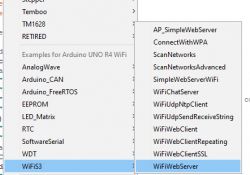
But after opening them, to our surprise, it turns out that HTTP parsing is implemented in a very simplified way and is not packed into separate classes:
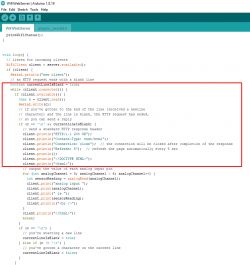
So I started looking for a library that would offer it to me.
I was interested in QuickSander job:
https://github.com/QuickSander/ArduinoHttpServer
However, as it soon turned out, there are a few problems with it:
- does not compile under Arduino R4 WiFi
- the examples are quite poor
- does not support parsing GET arguments, i.e. a link like:
https://www.elektroda.pl/rtvforum/search.php?search_id=egosearch&user=1234
The link above contains two arguments: one with the key "search_id" and the value "egosearch", and the other with the key "user" and the value "1234". It would be nice to be able to get them easily from this address....
In this topic, I will try to fix all three issues.
ArduinoHttpServer installation and fixes
We download ArduinoHttpServer from Libraries Manager, by the way, you also need to install one dependency, namely Base64:
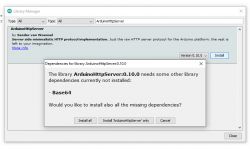
Then you can try to compile their example from Github but it will fail:
Code: C / C++
We will get a compilation error like this:

The pgmspace.h header is missing. We'll fix it right away. It is not actually needed in this case.
We open the library code, for me it is under:
C:\Users\Admin\Documents\Arduino\libraries\Base64\src\Base64.cpp
Just comment out this block (or add define for R4):
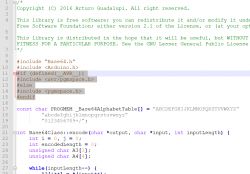
Now the example should work, but if we sometimes get a message like this:
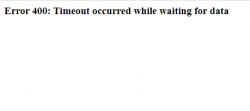
It's worth taking a look at:
C:\Users\Admin\Documents\Arduino\libraries\ArduinoHttpServer\src\internals\StreamHttpRequest.hpp
The problem is this piece of code:
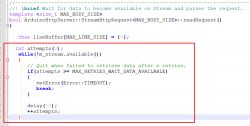
It just detects a timeout error. Initially, I wanted to increase the value of the MAX_RETRIES_WAIT_DATA_AVAILABLE constant:

but in the end I just commented out the whole block. From then on, the whole thing started to work a little more stable.
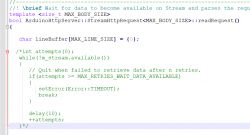
I don't know how correct this approach is, but after this change, this library works a bit more stable for me.
Usage example from the authors of ArduinoHttpServer
Let's take a moment to test the sample ArduinoHttpServer code provided by the author of the library. This code offers a simple HTTP authorization based on a mechanism built into the browser:
Code: C / C++
Indeed, after entering the site, we have a window asking for data:

After entering the wrong data in the log, we get:
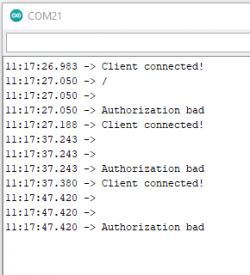
However, after entering the correct ones:
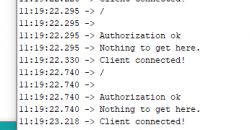
Authorization may be useful, but strangely enough, I don't see anything more fundamental anywhere, i.e. the ability to extract arguments from a GET request. We'll take care of it right away.
Argument parsing implementation
A short analysis of the library code shows that the HttpResource class is responsible for parsing the resource address. The author in this class only keeps one string and splits it up as needed:
Code: C / C++
The [] operator allows you to get to specific folders in the address of the resource:
Code: C / C++
All the magic happens in the snippet with the variable textField . The code checks if there is a GET argument with that name, and if so, it includes a message in the HTML displaying the textField value. If not, the display skips. In both cases, I continue to create an HTML form with a field named textField so that the user can easily send a GET request with the new value of this variable.
After opening the page we see:
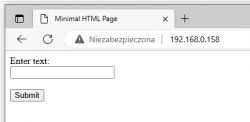
After typing the text "ArduinoFan" and sending:
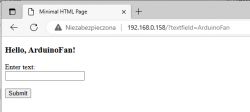
My GET argument handling seems to be working.
Hint - ArduinoHttpServer building and streams
Now I would like to point out a useful feature of the discussed library resulting from object-oriented and inheritance available in the environment used.
Consider the StreamHttpReply constructor that represents the HTTP response:
Code: C / C++
The first argument is an object of the Stream class, i.e. a stream. Various classes inherit from the Stream class, including network stream. Using StreamHttpReply then looks like this:
Code: C / C++
It was in the example you posted. But a stream is also an object Series , which is the Arduino serial port. This allows us to construct the following:
Code: C / C++
It may seem strange, but nothing prevents you from using the HTTP protocol on the UART stream, instead of the TCP stream. Let's consider a larger example:
Code: C / C++
Result in the console:
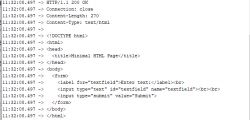
That's right, this code just printed the sent HTML with the HTTP header appended. This very nicely shows the hermetic and modular structure of this library.
Summary
Quite a nice and useful library. There were no big problems with porting it to R4, which is not surprising, because its mechanisms are based on the Stream class, which can be a common interface for many streams.
A bit strange that at the moment of writing this topic, this library did not support easy access to GET arguments, but it was enough to add one function to change it.
I'll test my code a bit more and then I'll open it pull request on Github to suggest my changes and improvements, maybe the author of the library will accept them and add them to his code.
That's it for now. Has anyone of the readers already created an HTTP server on Arduino R4? Do you see any potential uses for this library?
PS: Below is the patch I sent to the author of the library: https://github.com/QuickSander/ArduinoHttpServer/pull/23
Cool? Ranking DIY Helpful post? Buy me a coffee.



